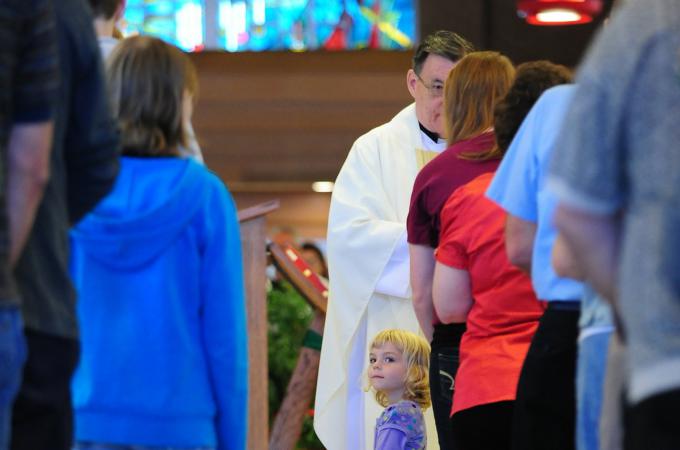Extraordinary ministers
Q. During Lent, more people than usual attend daily Mass in our parish. We have two assigned priests. For some reason, when the pastor celebrates Mass, the associate doesn't concelebrate but sits in a pew with the congregation. Then, when it is time for holy Communion, a lay minister helps the pastor distribute, and the associate walks up in the regular Communion line.
I always thought that lay ministers were supposed to be "extraordinary," i.e., used only when priests were unavailable. The associate is healthy and very capable, so I am confused. (Upstate New York)
A. Let me say first that your parish is blessed to have two priests. These days, in most of upstate New York -- which is where I, also, am from -- the situation is reversed: A single priest is scrambling to cover an entire slate of Masses.
As to the associate who attends daily Mass rather than concelebrates, I can understand. His presence on the altar is not required, and he probably feels that sitting instead in the pews highlights the "priesthood of the laity" and reminds the congregation that all worshippers are privileged to share in offering the eucharistic sacrifice.
As for the distribution of Communion, though, you are correct. Canon 910 of the church's Code of Canon Law states that the ordinary minister of Communion is a bishop, priest or deacon, and Canon 230 specifies that members of the laity may be asked to assist "when the need of the church warrants it and ministers are lacking."
The General Instruction of the Roman Missal (the "rule book" for liturgical celebration) is even clearer: "In the distribution of Communion, the priest may be assisted by other priests who happen to be present. If such priests are not present and there is a truly large number of communicants, the priest may call upon extraordinary ministers to assist him" (No. 162).
The reality is that in some parishes in the U.S., one or more of the laity assist in distributing Communion at every Mass -- even at daily Masses attended by only a handful of people. That, technically, is a violation of the guidelines -- although it surely does not affect the validity of the Eucharist that is received.
Q. Our diocesan regulations require that a couple give a parish nine months notice prior to a marriage ceremony. Is this an ironclad Catholic Church rule? I am an 80-year-old widower, planning on marrying an 81-year-old widow. We don't see the need for any premarital counseling, etc., since we have both been there before. (City of origin withheld)
A. No, it is not an ironclad and universal rule of the church. In 2005, the U.S. Conference of Catholic Bishops undertook a study of marriage preparation programs in the more than 100 dioceses around the country.
It found that most dioceses had a six-month guideline for the initial meeting with a priest before the wedding date itself. A few were shorter (three or four months), and several were longer (eight to 12 months).
The guideline was designed to accommodate not only the course of marriage preparation (traditionally called pre-Cana) but also the collection of necessary paperwork (baptismal certificates, etc., and, in your own case, documentation from previous marriages and death certificates of your first spouses).
Of course, the requirement for advance notice is a guideline, not a law, and it admits of reasonable exceptions in particular circumstances such as your own.
Why not simply talk to a local priest and see what he would recommend? There might still be a pre-Cana course, but it could well be abbreviated, and some dioceses offer a specific informational program for second marriages.
- Father Kenneth Doyle is a columnist for Catholic News Service



















